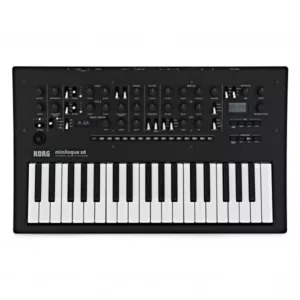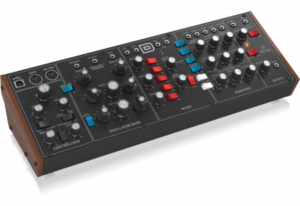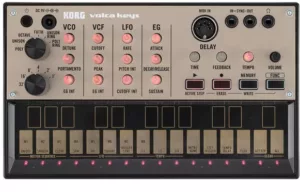Hello and welcome to the exciting world of synthesizers! If you’re reading this, chances are you’re poised to embrace the role of a budding musician eager to navigate the vast seascape of electronic sounds.
I remember my own first encounter with a synthesizer, astonished with the range of sounds that stemmed from a single piece of equipment. It’s a thrilling moment when you realize the palette of music you can create is virtually limitless.
Here, I’ll lay the groundwork for understanding what makes a great beginner synthesizer. Having the right tool can make all the difference in how quickly you can turn your musical ideas into reality.
Before taking a step further, let’s clarify what’s ahead. In the following section, I’ll explain synthesizers for you. You’ll learn what they do, the different types available, and the features that are must-haves for novices. Think of it as your prep course before we reveal which models are truly the best for those just starting out.
Understanding Synthesizers: A Beginner’s Guide
If you’re taking your first steps into the soundscapes crafted by synthesizers, it’s imperative to grasp what a synthesizer actually is. In essence, it’s an electronic musical instrument that generates audio signals to create sound. But there’s so much more to it.
When we peel back the layers, synthesizers reveal themselves to be intricate devices capable of molding frequencies and waveforms into whatever your imagination holds. They operate on the principles of oscillation and modulation to bring your musical ideas to life.
Beginners might find the distinction between analog and digital synthesizers particularly interesting. Analog synths use electronic circuits to generate signals directly, resulting in a warm, rich sound that many purists swear by. On the other hand, digital synthesizers employ digital signal processing (DSP) to simulate these sounds or create entirely new ones. This offers more flexibility and often includes a breadth of presets to experiment with.
So, what features should you look for as a beginner? Look for a synth that’s SIMPLE to navigate – you want to spend more time making music than reading the manual. A good number of presets can be advantageous, as they allow you to explore various sounds before you fully understand how to craft them from scratch. Additionally, consider the kind of keys and the number of octaves available; you’ll want something that suits your play style and comfort.
And lastly, connectivity is key. Ensure your synth can connect to other gear you own or plan to acquire, such as computers, speakers, and other instruments. This will be paramount as you dive into the vast world of music production.
The Top Beginner Synthesizers of the Year
When you’re eager to step into the vast universe of music creation, the synthesizer you select can either open up galaxies of sound or leave you tangled in a complex nebula. Your first instrument should be a launchpad to creativity, not a barrier. So, let’s focus on what really matters for a beginner.
Beginners need a balance of simplicity and functionality. It’s crucial that the learning curve isn’t steep — enough features to experiment and grow, but not so many that you’re overwhelmed from the get-go. Consider the synthesizer’s build quality, availability of presets, and the educational resources provided by the manufacturer.
If you’re watching your wallet — and most beginners are — it’s good news that high-quality does not always equal high-cost. Some of the best beginner synthesizers offer a strong array of features without requiring a hefty investment.
Here are some synths to consider that check these boxes:
1. KORG Miniloque XD— Unleash raw sonic power in the palm of your hands, sculpting a world of gritty analog charm and boundless creativity with every compact keystroke.
2. Behringer DeepMind 6 — Elevate your sound with 12 voices of pure analog richness, where innovation meets timeless warmth in every musical journey
3. Behringer Model D — Synthesize a symphony of sonic possibilities with four voices of vintage analog glory, where classic meets contemporary in every polyphonic masterpiece.
4. Korg Volca Keys — Unlock a universe of portable polyphonic exploration, where compact design meets limitless creativity, bringing the magic of analog synthesis to your fingertips.
5. Yamaha Reface CS — Redefine your sonic adventure with a compact gem, where analog innovation meets modern versatility, creating a synthesizer experience as unique as your musical journey.
6. Arturia Minibrute 2 — park sonic brilliance with a compact dynamo, where analog ingenuity meets modular flexibility, shaping a sound palette as dynamic as your musical vision.
Each synth brings something unique to the table, and many are loved for their intuitive interfaces, lightweight designs, and the variety of sounds they offer right out of the box.
Now, it’s worth mentioning that popularity doesn’t always equal the right fit. Get hands-on experience by testing synths at your local music store or through virtual demos online. Trust your intuition and how you feel when you play.
But what comes next after you’ve chosen your partner in musical exploration? I’ve got a few EFFECTIVE TIPS to get you harmonizing with your new synth in no time. Stay tuned.
Making the Most of Your First Synthesizer
So, you’ve got your hands on your first synthesizer. Now’s the time to turn those initial curious fumbles into harmonious mastery. But remember, the real magic doesn’t lie in the machine itself; it’s in how you use it.
First off, carve out a dedicated practice space where you can focus without distractions. Regular practice is non-negotiable if you want to improve. Establish a routine, even if it’s just 15 minutes a day, to explore new sounds and techniques.
Don’t overlook the plethora of online tutorials and resources available at your fingertips. From YouTube guides to in-depth courses, there’s a tutor out there for every style and learning pace. Dig into them; they’re a goldmine for speeding up your learning curve.
It’s also incredibly valuable to connect with other music enthusiasts. Whether it’s a local synth club or an online forum, being part of a community can provide not just feedback, but also motivation and inspiration. Sharing your progress and picking up tips from others can enrich your synth journey tenfold.
Lastly, patience is key. Like any instrument, mastering the synthesizer doesn’t happen overnight. Celebrate the small victories and keep pushing the boundaries of your creativity. Your evolution from beginner to maestro is a personal quest that’s as rewarding as the music you create. So here’s to the first step in your synthesis story — may your melodies be many and your beats be bold!
